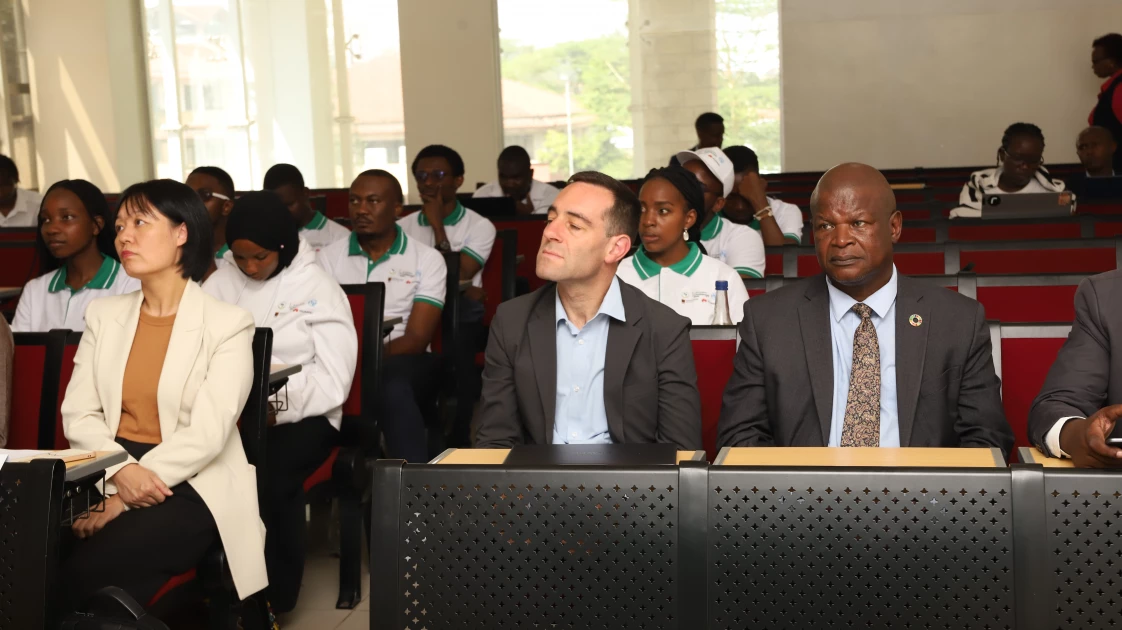10 winners of ATU Africa Innovation Challenge feted in Nairobi

Held in Nairobi, the awards ceremony—attended by top leaders ATU, International Telecommunications Union (ITU), Communications Authority of Kenya (CAK), and lead sponsor Huawei Technologies—marked the culmination of a rigorous program to empower the continent’s brightest minds.
This year’s challenge centered on artificial intelligence, with winners showcasing transformative solutions across agriculture, healthcare, energy, financial inclusion, education, and consumer protection.
From Sierra Leone, Mohamed Alpha introduced Fresh AI, a device that detects food spoilage to curb waste, empowering farmers and vendors to bolster food security.
In Tanzania, Alex Mkwizu’s Tausi Africa harnesses AI to create a credit-scoring platform, opening doors to inclusive lending for underserved communities. Kenya’s Esther Kimani brought forward Farmer Lifeline Technologies, an AI-powered tool that monitors agricultural emissions, paving the way for sustainable farming. Tanzania’s Henry Mathayo unveiled MedPack, a mobile app streamlining pharmaceutical procurement to ensure access to vital medicines, while Nigeria’s Promise Okwuchukwu presented PowerBox, an AI-driven battery module delivering reliable energy to off-grid areas.
Julius Mbungo, also from Tanzania, tackled the scourge of counterfeit vehicle spare parts with Spana, an AI platform safeguarding consumers and markets.
In Malawi, Chifuniro Misinde’s Kavel Decodes offers assistive learning technology for visually impaired students, fostering educational inclusion. Back in Tanzania, Kelvin Pius Paul’s Agro-Gen AI provides farmers with a chatbot delivering real-time advice to boost crop yields and resilience. Malawi’s Alinafe Kaliwo introduced Chameleon Tools, a soil moisture detection system optimizing irrigation and conserving water.
Rounding out the cohort, Tanzania’s Asya Haji debuted ClarioAI, an AI assistant that enhances business insights by analyzing customer behavior and providing product information.
Selected from a continental pool, winners earned an all-expenses-paid AI training program at Strathmore University’s @iLabAfrica, a leading ICT innovation hub. The intensive course, led by experts like Amr Farouk Safwat of the African Union and ITU’s Mohamed Ba, covered responsible AI ethics, prototype refinement, and business scaling.
CAK Director General David Mugonyi presided over the ceremony alongside ATU Secretary General John Omo, Huawei’s Sherry Zhang, and ITU’s Emmanuel C. Manasseh.
Mugonyi hailed the challenge as a “game-changer” for addressing systemic issues like food insecurity, climate change, and financial exclusion, emphasizing the role of supportive regulation in unlocking innovation.
“This year’s 10 finalists demonstrate how targeted technological solutions can address systemic challenges in agriculture, energy, healthcare, and climate resilience. Their work underscores a critical truth: Africa’s youth are not just participants in the digital revolution—they are its architects,” he said.
Mugonyi further highlighted CAK’s commitment to fostering innovation through its ICT Regulatory Sandbox, a controlled environment where innovators can test new technologies under flexible regulations.
“As the ICT industry regulator, we recognize the need to create a favorable environment for innovators. Our sandbox fosters collaboration while safeguarding public interest,” he noted.
However, he pointed to a key hurdle: fragmented regulations across Africa. “A sandbox in Kenya may not align with another country’s data localization laws, complicating cross-border scalability,” Mugonyi explained.
He urged the adoption of cross-border sandbox frameworks to harmonize standards while respecting national sovereignty, praising ATU’s efforts to push for unified regulatory policies continent-wide. “Harmonization is urgent to ensure innovations like these can scale seamlessly across borders,” he added.
John Omo praised the diversity of solutions, noting, “These AI-powered innovations are tackling Africa’s toughest problems head-on, from counterfeit products to unreliable energy access. They’re a testament to what’s possible when talent meets opportunity.”
Huawei, a mainstay in Africa for over 25 years, underscored AI’s potential to reshape the continent. “These innovators are already solving real-world challenges with AI, and we’re thrilled to support their journey,” said Sherry Zhang, Huawei’s Director of ICT Strategy for Sub-Saharan Africa.
She urged stakeholders to prioritize connectivity, cloud infrastructure, and skills training to supercharge local innovation ecosystems.
ITU’s Cosmas Luckyson Zavazava called the challenge a “vital platform” for nurturing talent, emphasizing its role in fostering socio-economic growth. “These young innovators are building a stronger, more inclusive Africa,” he said.
As the fourth edition wraps, anticipation builds for the fifth, with organizers urging African innovators to prepare for the next call. The ATU Africa Innovation Challenge continues to cement its reputation as a launchpad for transformative ideas, proving that Africa’s future is in the hands of its youth.
Want to send us a story? SMS to 25170 or WhatsApp 0743570000 or Submit on Citizen Digital or email wananchi@royalmedia.co.ke
Comments
No comments yet.


Leave a Comment